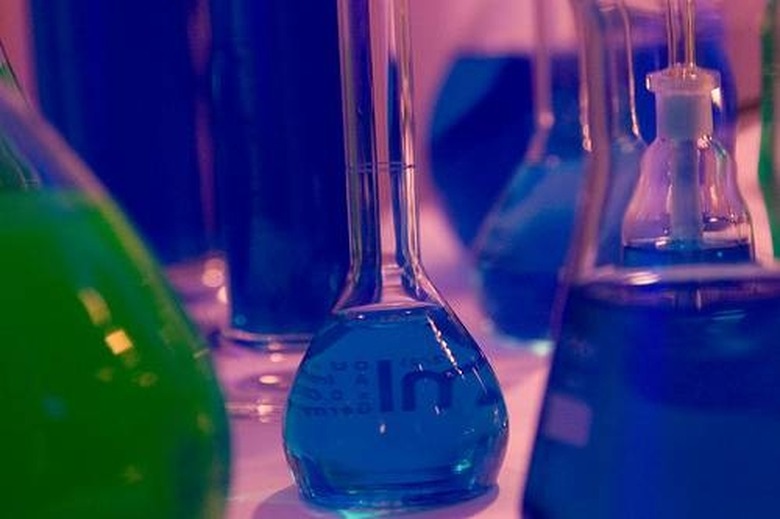How To Chemically Refine Gold
The quality of gold is measured by a rating known as carats. This is why gold items are stamped with 10k, 14k, 18k, etc. Gold with a higher carat rating has more gold content than gold with a lower carat rating. For example, 14k gold is roughly 58 percent gold content, 18k gold is roughly 75 percent gold content and 24k gold is pure gold. The remaining percentage of gold that is not pure is made up of copper and other metals that were fused into the gold when it was in a molten state. It is possible to use a chemical process to remove these excess materials so that your gold is more refined. Using this process, you can turn lower quality gold into pure 24k gold. Follow these steps to learn how to chemically refine gold to its pure state.
Step 1
Take proper safety precautions. You will be working with volatile chemicals during the process of refining the gold. Aqua regia, in particular, is a dangerous chemical that is capable of burning through human flesh. Thick rubber gloves, a rubber apron and safety goggles should be worn at all times. Use a face mask if at all possible, similar to the ones worn by asbestos removal professionals. This will help protect you from any toxic fumes released by the chemicals.
Step 2
Place your gold in the bottom of a chemistry beaker. If you have enough gold that it is stacked more than a couple of inches in the bottom of the beaker, you may want to consider breaking it up into multiple portions rather than refining it all at the same time. If a chemistry beaker is not available, a thick Pyrex brand glass container will do, but the chemistry beaker is preferred because it is a taller/deeper container to work with.
Step 3
Slowly pour the aqua regia into the beaker. Fill the beaker halfway with this chemical. Pour very slowly, being extra careful not to splash any of the chemical. Aqua regia is a volatile chemical that will burn through your clothing, skin and muscle tissue upon contact. Use the chemicals in a well-ventilated area to reduce the amount of toxic fumes in the air.
Step 4
Fill the remaining half of the beaker with sodium meta bisulphate. Again, pour the chemical slowly, being careful not to splash or to overfill the container. Allow the mixture to sit for approximately one hour per ounce of gold being refined. The combination of aqua regia and sodium meta bisulphate will burn away any copper or other metals that are locked into the gold, leaving only pure 24k gold behind.
Step 5
Recover the gold from the chemical solution. Carefully drain the chemicals from the beaker into a glass jar, where they can be stored for future use. Leave the gold in the bottom of the chemistry beaker until the remaining chemicals have evaporated. Rinse the gold thoroughly with water and allow it to air dry. You have now chemically refined your gold to its pure 24k state.
Things Needed
- Gold
- Chemistry beaker
- Aqua regia (chemical)
- Sodium meta bisulphite (chemical)
- Rubber gloves
- Rubber apron
- Safety goggles
- Face mask
Warning
Do not use this process on jewelry expecting to have 24k gold jewelry at the end. You will have 24k raw gold rather than jewelry. It is best to reserve this process for use on scrap gold.
Cite This Article
MLA
Garner, Jerry. "How To Chemically Refine Gold" sciencing.com, https://www.sciencing.com/chemically-refine-gold-4798976/. 24 April 2017.
APA
Garner, Jerry. (2017, April 24). How To Chemically Refine Gold. sciencing.com. Retrieved from https://www.sciencing.com/chemically-refine-gold-4798976/
Chicago
Garner, Jerry. How To Chemically Refine Gold last modified March 24, 2022. https://www.sciencing.com/chemically-refine-gold-4798976/
